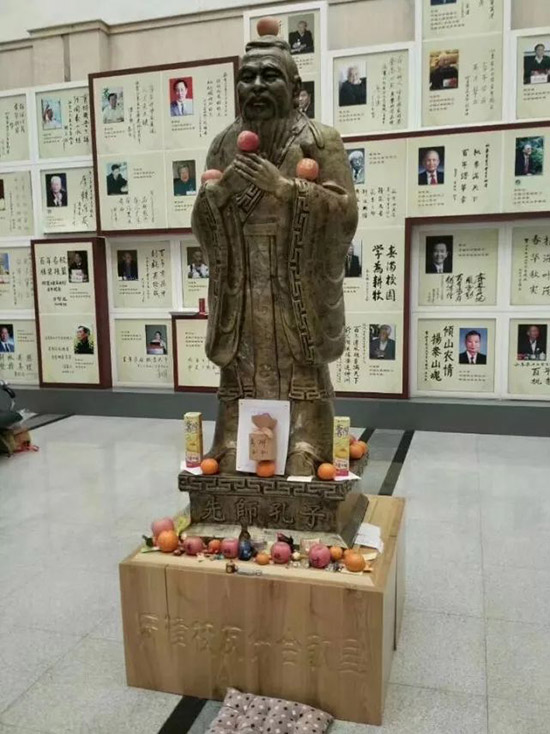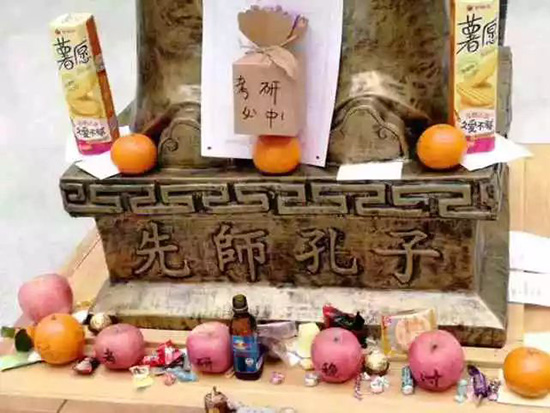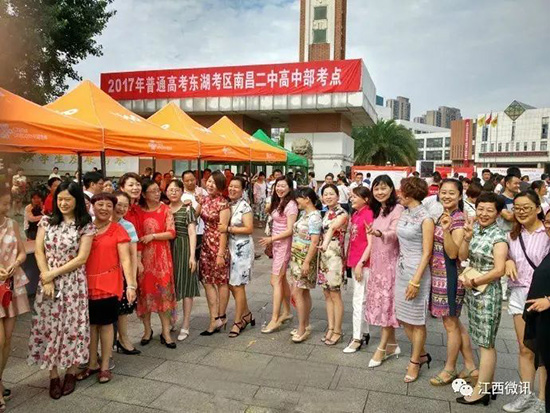

A Confucius statue in Shandong Agricultural University was filled with various kinds of offerings from students taking part in the national post-graduate entrance examination from Dec 23 to 24.

A Confucius statue in the library of Shandong University of Agriculture.
Underneath the statue are fruits, snacks, handwritten-letters to Confucius, and even money are placed there by students who wish for better luck in the test. But campus security and cleaners clear it of worship gifts. “I often found some snacks, drinks, and fruits under the statue, but I thought they were personal belongings only left there temporarily,” said a cleaner. “During the exam period, it gets crazy, so I have to clear it up.”
The exam is one of the most influential examinations for Chinese students, and various superstitions tend to be followed by both students and parents.

Students put fruits and soft drinks under the Confucius statue for good luck.
Many mothers of examinees will wear cheongsam to wish for victory in the exam. Taobao, a shopping site, even promotes ridiculous but creative commodities like “IQ recharge cards” and “exam failure insurance,” which are popular among students.

Moms wearing cheongsam to cheer up their to-be-examined kids.
When there is demand, there is market. The buzzword “sense of ceremony” was coined online, meaning certain simplified gestures can make a huge difference in important events. People often unconsciously turn to superstition for a sense of ceremony when they are at a turning point in their lives. However, experts said it is actual efforts that bring us the expected results; artificial superstitious objects can only create imagined dreams.
 Fire brigade in Shanghai holds group wedding
Fire brigade in Shanghai holds group wedding Tourists enjoy ice sculptures in Datan Town, north China
Tourists enjoy ice sculptures in Datan Town, north China Sunset scenery of Dayan Pagoda in Xi'an
Sunset scenery of Dayan Pagoda in Xi'an Tourists have fun at scenic spot in Nanlong Town, NW China
Tourists have fun at scenic spot in Nanlong Town, NW China Harbin attracts tourists by making best use of ice in winter
Harbin attracts tourists by making best use of ice in winter In pics: FIS Alpine Ski Women's World Cup Slalom
In pics: FIS Alpine Ski Women's World Cup Slalom Black-necked cranes rest at reservoir in Lhunzhub County, Lhasa
Black-necked cranes rest at reservoir in Lhunzhub County, Lhasa China's FAST telescope will be available to foreign scientists in April
China's FAST telescope will be available to foreign scientists in April "She power" plays indispensable role in poverty alleviation
"She power" plays indispensable role in poverty alleviation Top 10 world news events of People's Daily in 2020
Top 10 world news events of People's Daily in 2020 Top 10 China news events of People's Daily in 2020
Top 10 China news events of People's Daily in 2020 Top 10 media buzzwords of 2020
Top 10 media buzzwords of 2020 Year-ender:10 major tourism stories of 2020
Year-ender:10 major tourism stories of 2020 No interference in Venezuelan issues
No interference in Venezuelan issues
 Biz prepares for trade spat
Biz prepares for trade spat
 Broadcasting Continent
Broadcasting Continent Australia wins Chinese CEOs as US loses
Australia wins Chinese CEOs as US loses